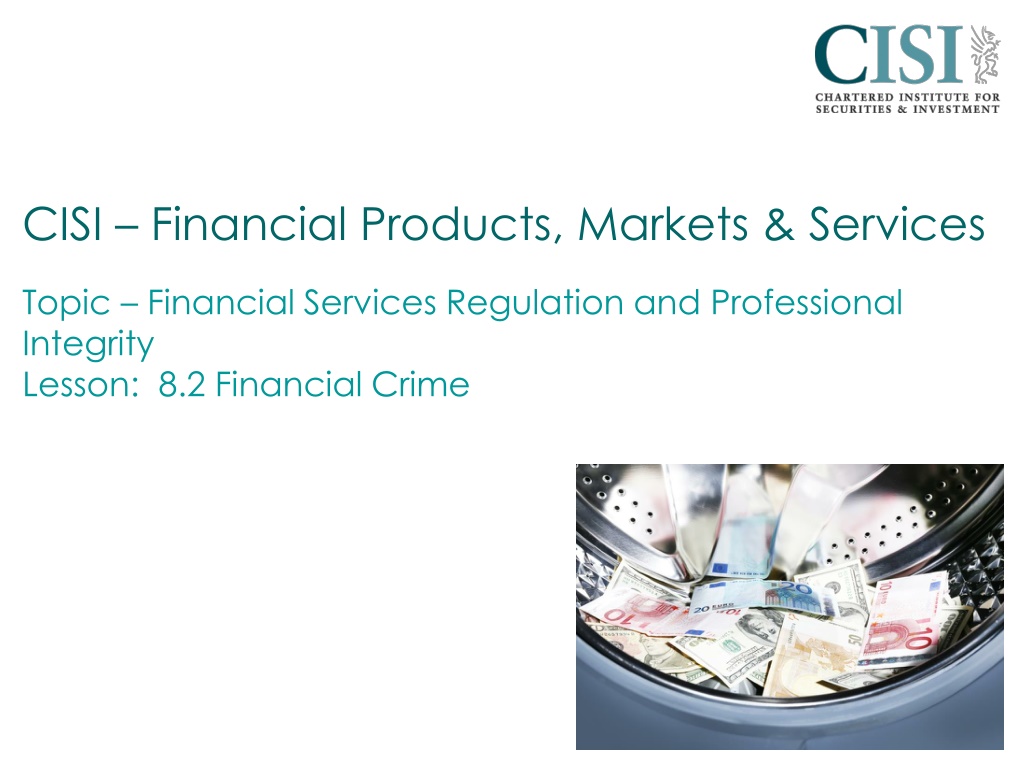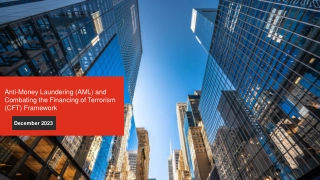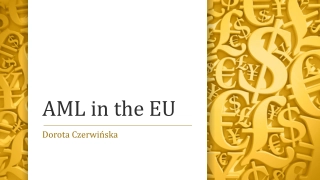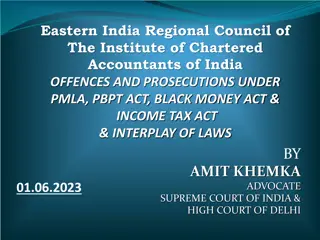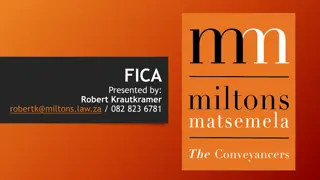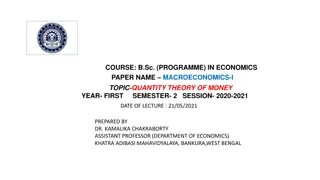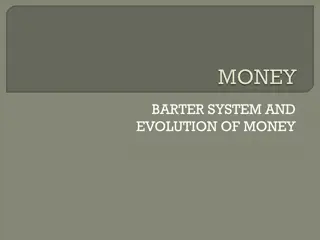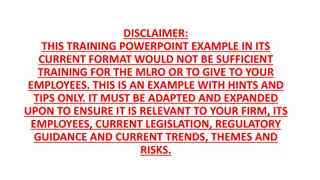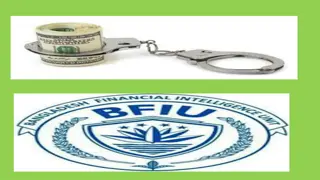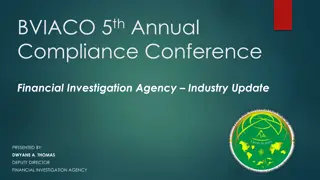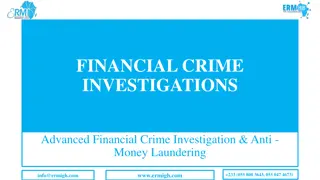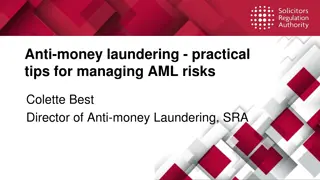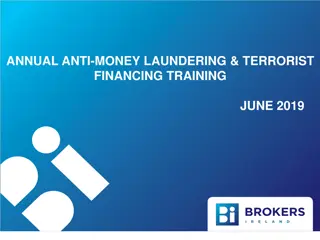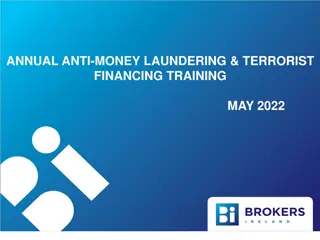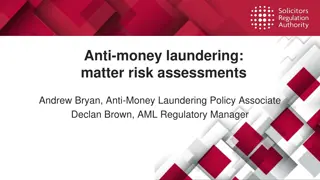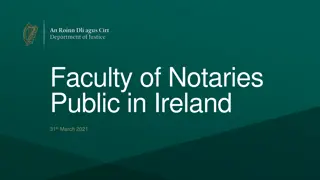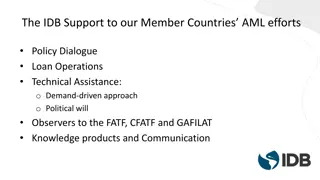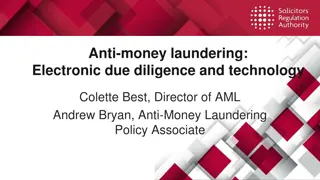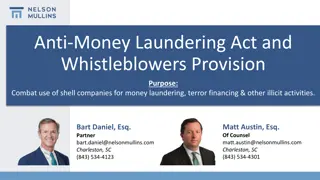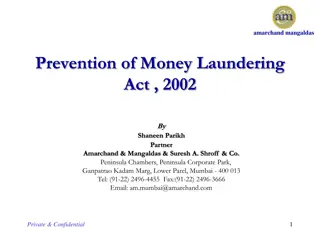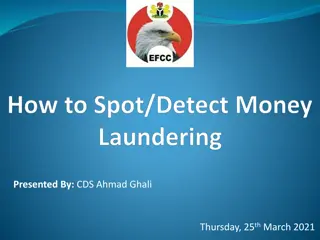Understanding Money Laundering Regulations and Professional Integrity in Financial Services
Money laundering is the process of disguising criminal proceeds to make them appear legitimate. This illicit activity involves three stages - placement, layering, and integration. International cooperation is essential in combating money laundering, with organizations like the Financial Action Task Force setting standards. The UK has specific laws like the Proceeds of Crime Act and Money Laundering Regulations to tackle money laundering offenses, emphasizing the importance of reporting suspicions and maintaining internal controls.
- Money Laundering
- Financial Services Regulation
- Professional Integrity
- Financial Crime
- UK Regulations
Download Presentation

Please find below an Image/Link to download the presentation.
The content on the website is provided AS IS for your information and personal use only. It may not be sold, licensed, or shared on other websites without obtaining consent from the author. Download presentation by click this link. If you encounter any issues during the download, it is possible that the publisher has removed the file from their server.
E N D
Presentation Transcript
CISI Financial Products, Markets & Services Topic Financial Services Regulation and Professional Integrity Lesson: 8.2 Financial Crime cisi.org
What is Money Laundering? The goal of a large number of criminal acts is to generate a profit for the individual or group that carries out the act. Money laundering is the processing of these criminal proceeds to disguise their illegal origin. This process is of critical importance, as it enables the criminal to enjoy these profits without jeopardising their source. Financial Action Task Force (FATF), 2016 During the prohibition era, notorious gangster, Al Capone allegedly bought Laundromats to mix proceeds from criminal activity with legitimate business sales cisi.org
The Three Stages of Money Laundering 3 Stages of money laundering Placement Placing dirty money into a bank or building society account Cash generated through crime e.g. drugs, arms, stolen goods dirty money The cash gained through illegitimate needs to be laundered from dirty to clean money - as large transactions are not normally made using cash Layering Moving money around so that authorities cannot trace it e.g. buying and selling currency, shares or bonds Money which appears to have been legitimately required more easily invested and spent clean money Integration Dirty money is now clean the ultimate beneficiary is holding legitimate funds that can be integrated back into the financial system. cisi.org
The Legal and Regulatory Framework The cross-border nature of money laundering has led to international co-ordination to combat money laundering Financial Action Task Force (FATF) http://www.fatf-gafi.org/home/ Issued recommended minimum standards for countries: Expect staff and firms to be able to identify suspicions of money laundering and report them. Inter-governmental body , based at the OECD in Paris, developing and promoting international policies to combat money laundering. Reporting made to a central point in the firm Money Laundering reporting Officer (MLRO) cisi.org
The Legal and Regulatory Framework - UK Main laws and regulations relating to money laundering in the UK THE PROCEEDS OF CRIME ACT MONEY LAUNDERING REGULATIONS These regulations were brought in to implement the EU directive on money laundering. Extended UK legislation main offences: 1. Knowingly assisting in concealing, or arranging for the acquisition, use or possession of criminal property. They specify the arrangements a firm must have in place to cover areas such as: 2. Failing to report knowledge or suspicions of possible money laundering. 3. Tipping off another person that a money laundering report has been made. Record-keeping Internal Controls Reporting requirements 4. Impeding an investigation e.g. Destroying documents. Up to 14-years for the offence Up to 5-years for failing to report or destroying relevant documents 2-years for tipping off POCA and the Money Laundering Regulations require a court to take account of industry guidance when considering whether a person has committed an offence. This guidance is provided by the Joint Money Laundering Steering Group (JMLSG 17 financial sector trade bodies.) cisi.org
The Joint Money Laundering Steering Group (JMLSG) JMLSG provides guidance to UK firms on the following Money Laundering Reporting Officer (MLRO) Internal Controls Risk-Based Approach Customer Due Diligence (CDD) Staff Awareness/ Training Record-Keeping Controls and systems must be in place to manage risk. Must assess and decide how to manage the risks. Firms must confirm and verify information about their customers depending on their level of risk. Money laundering training needs to be provided for staff in the causes, issues, laws, regulations and procedures. Firms must have the right systems and keep the appropriate records 5- years of customer identity evidence, transactions, actions and Director or Senior Manager oversees the firm s compliance with the regulator s rules. They report to the National Crime Agency (NCA). Establish and maintain risk- based policies (appropriate to the firm) and procedures to prevent money laundering cisi.org information. http://www.jmlsg.org.uk/
What is Bribery? Bribery is the giving or receiving of a financial or other advantage in connection with the "improper performance" of a position of trust, or a function that is expected to be performed impartially or in good faith. The Bribery Act 2010 Bribery does not have to involve cash or an actual payment exchanging hands and can take many forms such as a gift, lavish treatment during a business trip or tickets to an event. cisi.org
Bribery Offences A firm must have adequate procedures in place . Came into force July 2011 Develop well-designed policies, procedures and controls to ensure compliance. Offering , promising or giving an advantage Requesting , agreeing to receive or accepting an advantage Top-level commitment with the board and senior management committing to conducting business in a fair, honest and ethical manner. Bribery of a foreign public official to obtain or retain business or an advantage Bribery risks should be monitored, evaluated and reassessed regularly along with undertaking staff surveys. Failure by a commercial organisation to prevent a bribe being paid for or on its behalf. (Makes it easier for the Serious Fraud Office to prosecute companies when bribery has occurred) Ongoing risk assessments carried out (external and internal risks) Penalties Include: Max 10-Years in prison Unlimited fines Confiscation of proceeds Debarment from public sector contracts Director disqualification Policies and Procedures communicated internally along with training (Code of conduct) Only defence for a corporate entity is that they can show adequate procedures were put in place to prevent bribery Due Diligence undertaken on suppliers carrying out services on behalf of the company. cisi.org http://www.thebriberyact2010.co.uk/
Identity Fraud All firms may find themselves targeted by criminals. Staff working in financial services firms need to be aware that of theft of customer data to facilitate identity fraud Identity Fraud Use of a misappropriated identity in criminal activity. Obtaining goods or services by deception Using forged identity documents e.g. Passport or driving licence Identity Theft Impersonation fraud Using the identity of an other person without their knowledge or consent to obtain goods and services in that person s name Could be use of a person s date of birth, date of birth, current or previous addresses Firms need To verify the identity of a person applying for credit/Investment services/a new account/access to an existing account Robust Customer Due Diligence (CDD) procedures cisi.org
